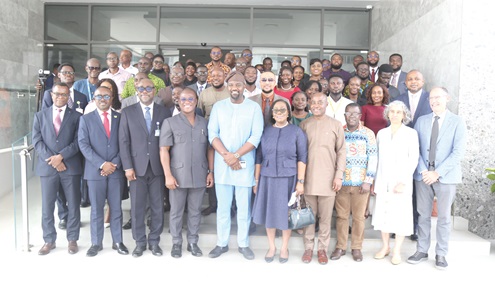The country has secured technical assistance from the International Civil Aviation Organisation (ICAO) to conduct a feasibility study into the development of sustainable aviation fuels (SAF) in the country.
The study, which is expected to be completed in the next six months, will enable the country to develop sustainable aviation fuels.
It is being funded by the United Kingdom (UK) through the ICAO Environment Fund.
The deployment of the sustainable aviation fuel initiative addresses the global call for decarbonisation, with the potential to reduce life cycle carbon emissions by about 80 per cent compared to conventional fossil-based jet fuel.
Also, it can power aircraft engines without modification, making it an immediate and viable solution for greener air travel and also mitigating the environmental impact on the aviation industry.
Event
In line with that, a two-day high-level workshop for aviation industry stakeholders to build capacity to drive progress towards sustainable aviation practices has been organised in Accra by the Ghana Civil Aviation Authority (GCAA), in collaboration with the International Civil Aviation Organisation.
Participants include key national stakeholders from the aviation, energy, agriculture and environment sectors.
Adoption
The Minister of Transport, Joseph Bukari Nikpe, in a speech read on his behalf by the Deputy Minister of Food and Agriculture, John Dumelo, said the production and adoption of aviation fuels required a clear understanding of the nation’s potential, policy frameworks, technical capabilities and investment opportunities.

He said Ghana had already developed the National Energy Transition Plan (2022-2070), which establishes a comprehensive framework to effectively support the country in fulfilling its commitments as outlined in the nationally determined contributions (NDCs).
The minister said the plan recognised the inherent unsustainability of the current energy landscape and the challenges it presents.
“It, therefore, draws a pathway to achieving a net-zero emission future for Ghana’s development and aspirations.
“We aim, among others, to establish policies and regulatory environments to support sustainable aviation and cleaner energies and also develop a clear roadmap and action plans for national SAF deployment in Ghana,” he added.
Beneficiaries
The Deputy Director-General in charge of Finance and Administration at GCAA, Juliet Okae, said Ghana was one of the countries selected to benefit from the feasibility studies.
“SAF can be produced from feedstock, used cooking oil and other waste materials.
There is a huge potential for Ghana to create jobs in line with the government’s agenda to create opportunities for the youth and promote economic development in a sustainable way,” she said.
The Project Coordinator at ICAO Office of Environment, Cesar Velarde, said sustainable aviation fuel presented opportunities not only in the environment sector but also for economic growth and development.
“The workshop is a kick-off of a six-month technical assistance project which would include a feasibility study by working closely with GCAA and national stakeholders to establish the materials that are appropriate for SAF,” he added.
